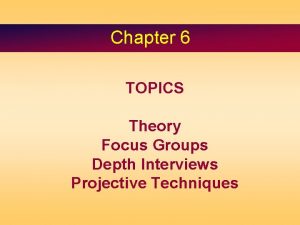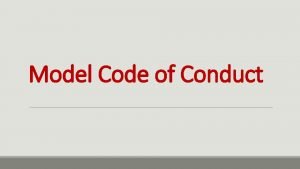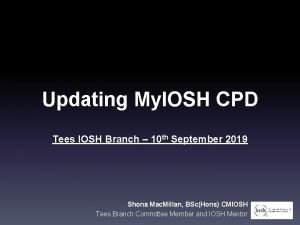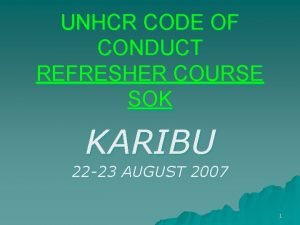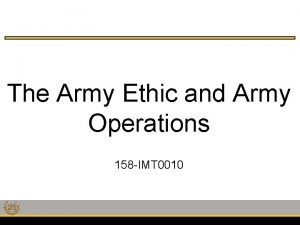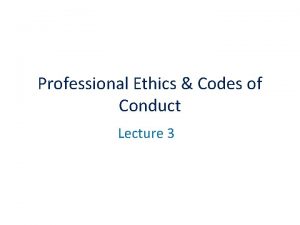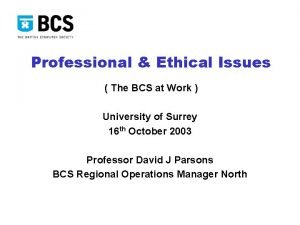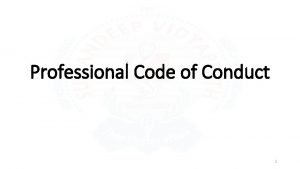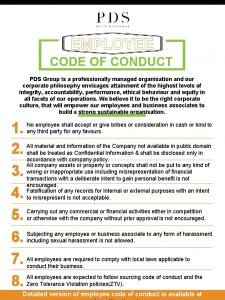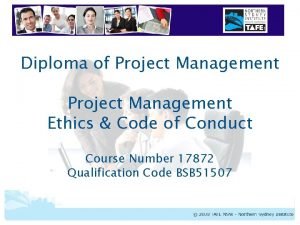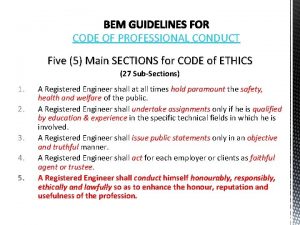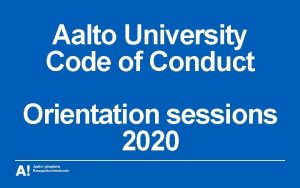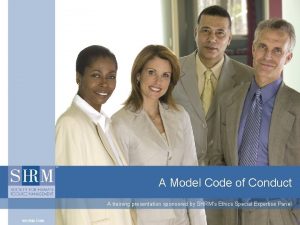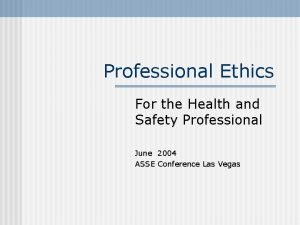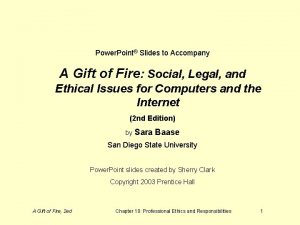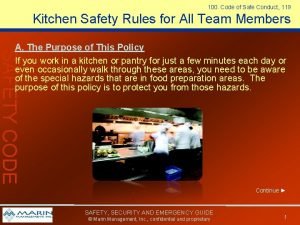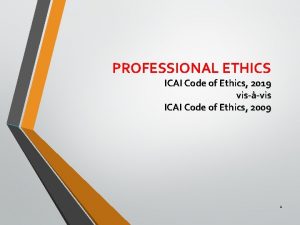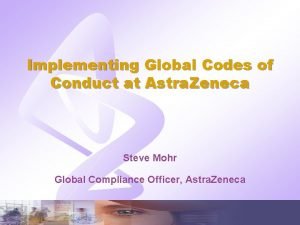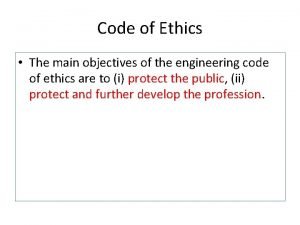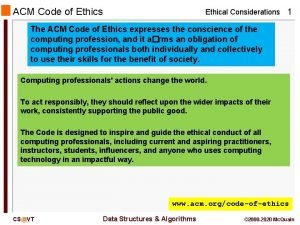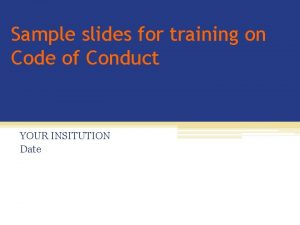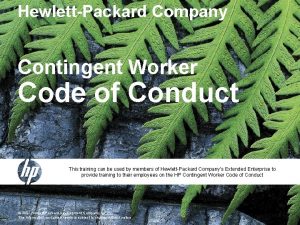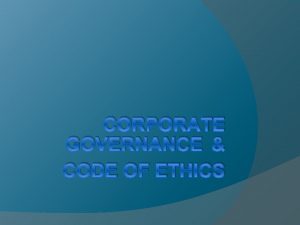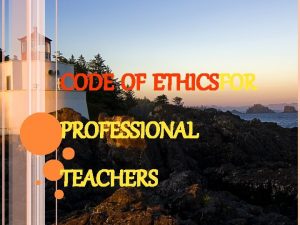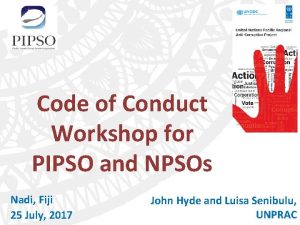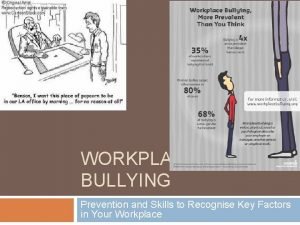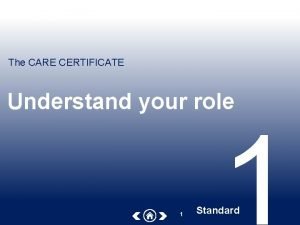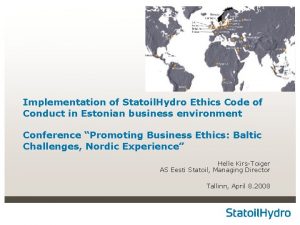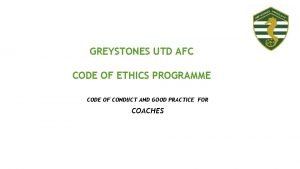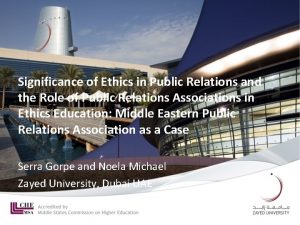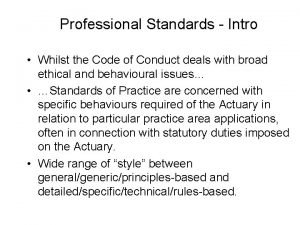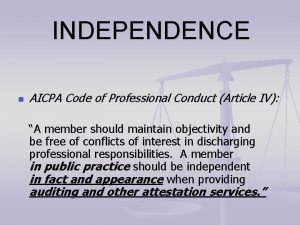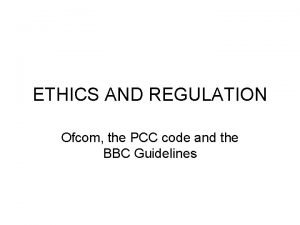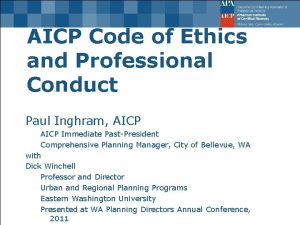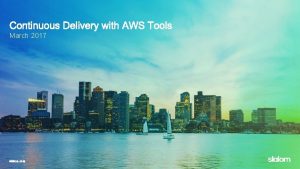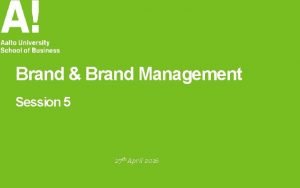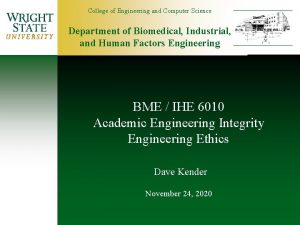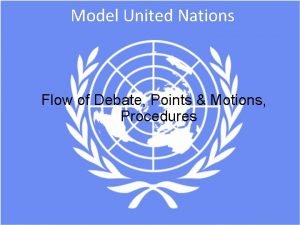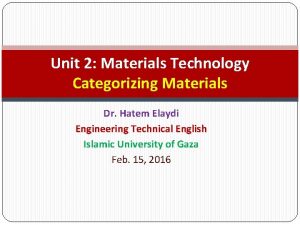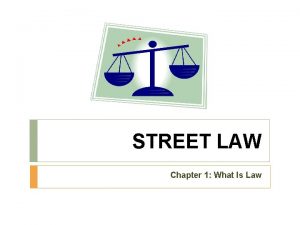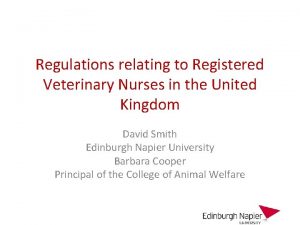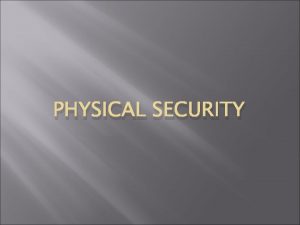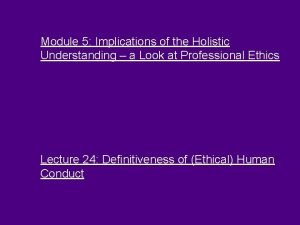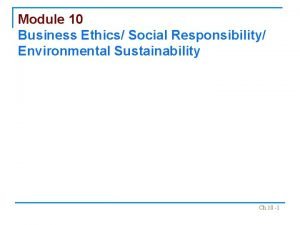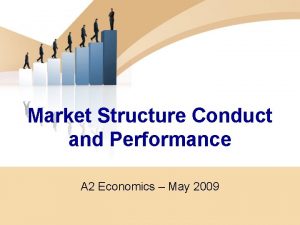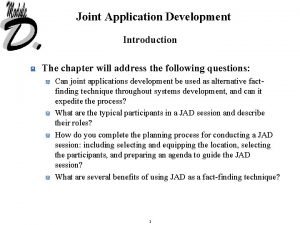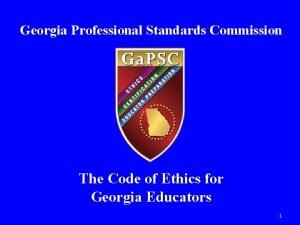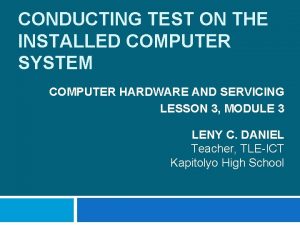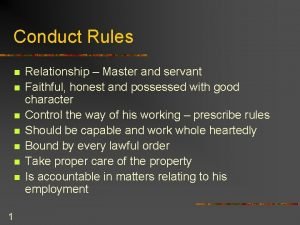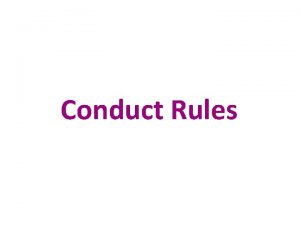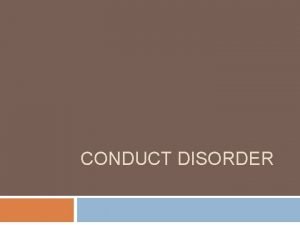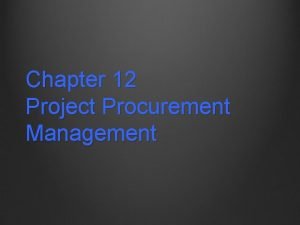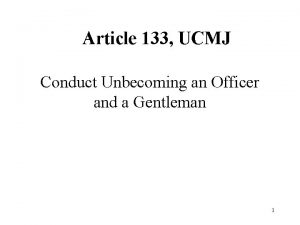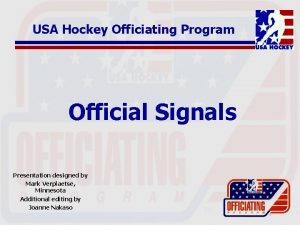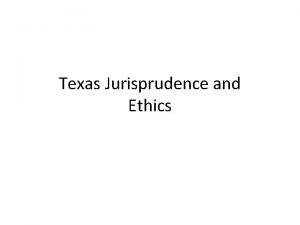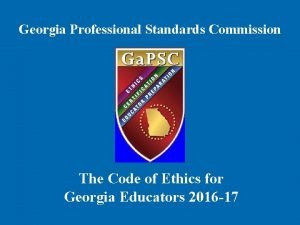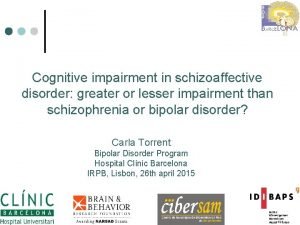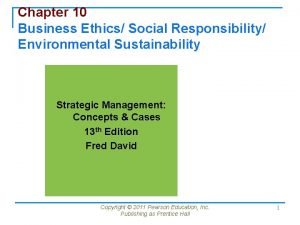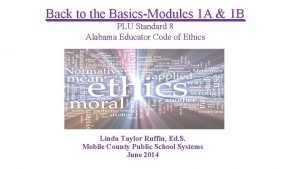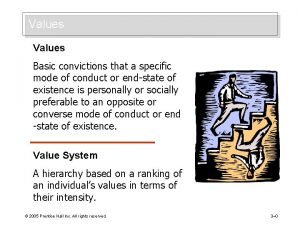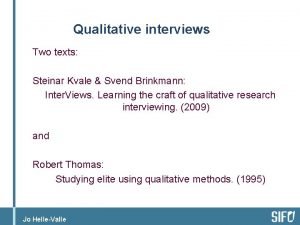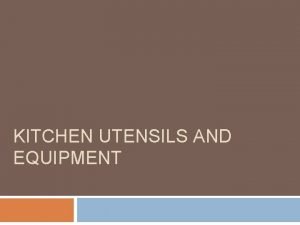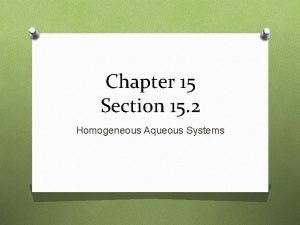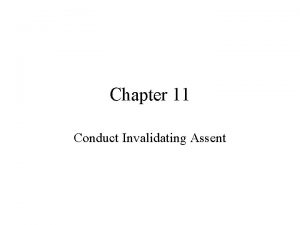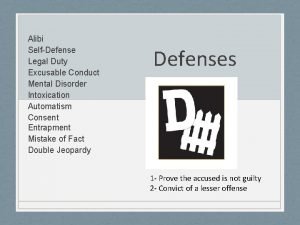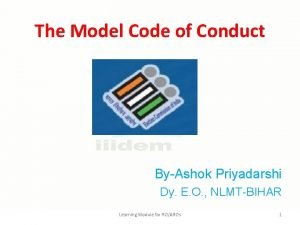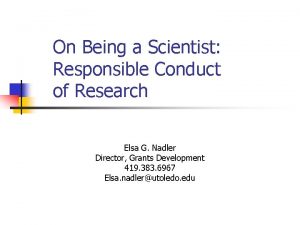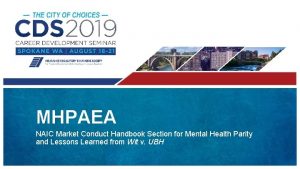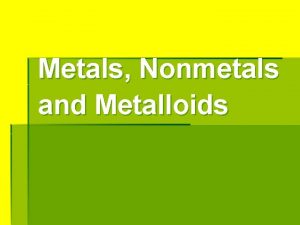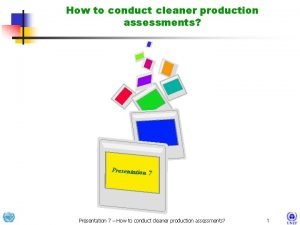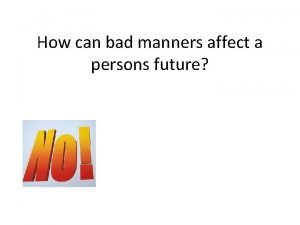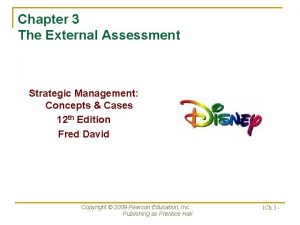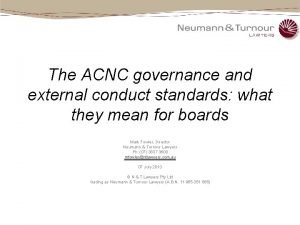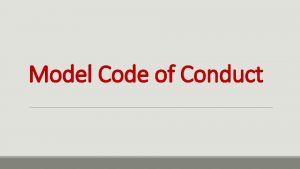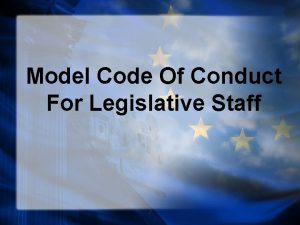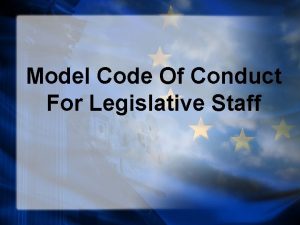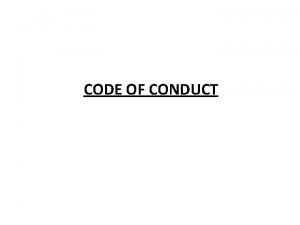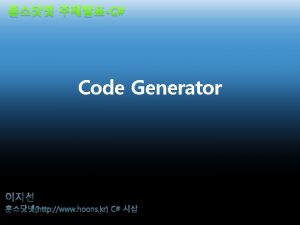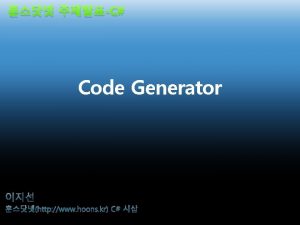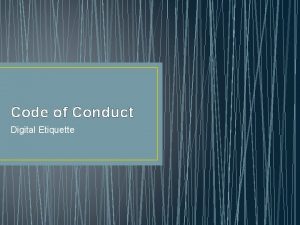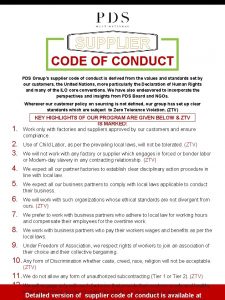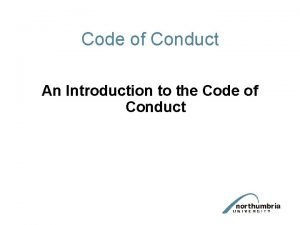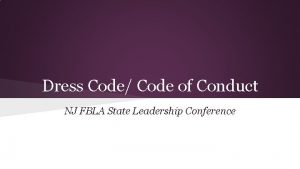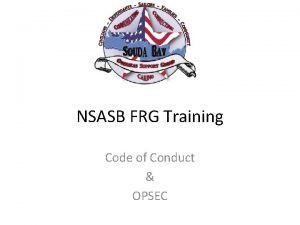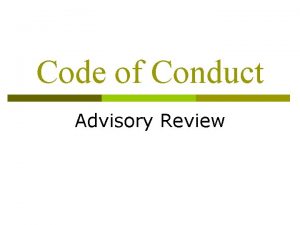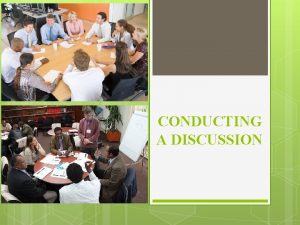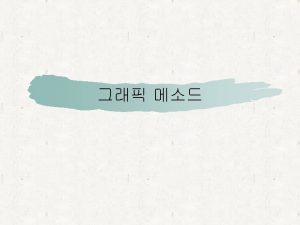Model Code of Conduct Points of Discussion 1
































































































- Slides: 96

Model Code of Conduct

Points of Discussion 1. Objective and rationale behind MCC 2. Mechanism of MCC 3. Complaint Redressal 4. Broad Areas of Application 5. Stock taking prior to announcement 6. Activities to be taken up immediately after announcement 7. MCC applicable to officials 8. MCC & Ban on transfer of officials 9. MCC for Ministers/Chairmen/ Members of Commissions 10. MCC for political parties/candidates 11. MCC for State/Central Govt 12. MCC for Use of Official Vehicles 13. MCC - Dos & Don’ts for Political Parties/Candidates 14. FAQ on MCC

1/1: Objective of MCC • To maintain a healthy and peaceful atmosphere conducive to the conduct of smooth elections • To provide level playing field for all parties. • MCC comes into operation from the day of announcement by the ECI

1/2. Rationale behind MCC §Enhances the credibility of the elections and gives confidence to the stakeholders/voters. §Ensures that official machinery for the electoral purposes is not misused. §Ensures that electoral offences, malpractices and corrupt practices such as impersonation, bribing and inducement of voters, threat and intimidation to the voters, is prevented by all means.

2. Mechanism of MCC §Formation of a Quick responsive team under the leadership of a senior officer to look in to the matters of MCC. §Suo moto actions will also have to be initiated in case/s of violation of MCC. §Videography to be made for every action taken by the MCC team §Close liaison to be maintained with Expenditure Monitoring cell for monitoring election expenses by the candidates §Daily reports to be made in prescribed format

3. Complaint Redressal §For an effective complaint redressal system prior planning essential for managing the complaints keeping in mind the number of complaints lodged during the previous elections. §Emphasis to be given for timely disposal of complaints lodged through portal, Samadhan and c. Vigil §Accordingly draft the infrastructure requirements and the personnel required §A well publicized Toll free Help line number must be operative from the beginning of MCC period §Complainant to be informed of the action taken by the RO/ARO

3/1. c. VIGIL-Vigilant Citizen §c. VIGIL app has been launched by Election Commission of India is aimed to create a fasttrack complaint reception and redressal system. §c. VIGIL is an innovative mobile application for citizens to report Model Code of Conduct and Expenditure violations during the elections. §Uniqueness: only allows Live Photo/ video with auto location capture from within the app to ensure digital evidence for flying squads to act upon in a time-bound manner. §Connects vigilant citizens with District Control Room, Returning Officer, and Field Unit (Flying Squads) / Static Surveillance Teams. §Important Features: -Usable only within geographical boundary of States where elections are being held -Does not allow uploading of the pre-recorded images/ videos, or photos from the phone gallery. -To prevent misuse of the system and to avoid repetitive complaints from the same spot, the system forces time delay of 5 minutes between successive complaints by the same person. -District Controller has the option of dropping duplicate, frivolous and unrelated cases even before the cases are assigned to the field unit.

3/2. c. VIGIL-Vigilant Citizen §c. VIGIL Citizen App (Mobile App) §c. VIGIL District Controller (Web based) §c. VIGIL Investigator (Mobile app for Field Units) §c. VIGIL Decider (Web based for Returning Officer) §c. VIGIL Monitor (Mobile App for CEO, DEO, RO) §c. VIGIL Observer (Mobile App for Central Observers)

3/3. c. VIGIL-Vigilant Citizen Step 1: A citizen clicks a picture or records a 2 -minute video which is uploaded on the app, along with an automated location mapping by the GIS, the citizen gets a Unique ID to track and receive follow up updates. The app user has the option of registering complaints anonymously but in that case the user will not be getting further status messages because the system will not be capturing the phone details. 5 mins Step 2: The information beeps in the District Control Room from where it is assigned to Flying Squads, Static Surveillance Team, Each Field Unit will have a GIS-based mobile application called ‘c. VIGIL Investigator’, which allows the field unit to directly reach the location by following the GIS cues and navigation technology and take action. Time taken: 15 mins Step 3: Action taken by the field unit in 30 mins and report is sent by them online through the Investigator App to the concerned Returning Officer for decision and disposal. If the incident is found correct, the information is sent to the National Grievance Portal of the Election Commission of India for further action and the vigilant citizen is informed about the status within 100 minutes.

4: Broad areas of Application §Execution of welfare schemes and Government work. §Publicity / campaign on welfare schemes and Government work. §Appointment, transfer and posting of Government officials. §Use of Rest House, Dak Bungalow and other Government accommodation. §Provisions regarding tour of Ministers / Political functionaries. §Use of official aircrafts/vehicles. §Use of loudspeaker. §Printing of pamphlet, posters & other media activities.

5. Stock taking Prior to Announcement A stock taking may be done before announcement of elections on the materials displayed at the following places, which may attract the provisions of MCC once election is announced and will help to initiate suo-moto actions: • building/ structure owned by the state/ central government/ any local authority • buildings/ fence of an educational institution or hospital • buildings used for religious purpose • electrical installations (transformer, lamp post etc. ) • water supply installations • public transport • heritage buildings • road, if that obstruct traffic/ pedestrial movement • advertisement spaces provided on rent by govt. deptts. /local bodies/PSU

6. Activities to be taken up immediately after announcement Defacement of Govt. property To be removed within 24 hrs from announcement of elections Defacement of public property and misuse of public place(Railway stations, Bus stands, Airports, Railway bridges, Roadways, Govt. Buses, Electric/Telephone Poles, etc To be removed within 48 hrs from announcement of elections Defacement of Private Property To be removed within 72 hrs from announcement of elections Total ban on use of Official vehicle by any political Party or candidate or any other person connected with election To be complied within 24 hrs of announcement of elections Advertisement at the cost of public exchequer Immediate action to remove any ad in print/electronic media soon showing achievements of the Govt. soon after announcement Photograph of Political functionary at official website Immediate action to remove or hide FS/SST/Video Team Immediately activated Complaint monitoring System/Call centre 24 x 7 To be operational within 24 hrs ECI letter no 437/6/1/ECI/INST/FUNCT/MCC/2017 dtd 25/10/17

7/1: Model Code of Conduct for Officials q. Any official who meets the Minister on his private visit to the constituency where elections are being heldshall be guilty of misconduct under the relevant service rules; and if he happens to be an official mentioned in Section 129 (1) of the Representation of People Act, 1951, he shall also be additionally considered to have violated the statutory provisions of that Section and liable to penal action provided there under. q. There are restrictions on tours / leave of the officers whose spouses are active in Political arena. In such cases, the concerned officers should not leave their HQs either on leave or on tour till the elections are complete (Instruction SL. No. 9, EC letter No. 437/6/98 -PLN-III dated 23. 01. 1998)

7/2: Model Code of Conduct for Officials No video conferencing should take place between the Chief Ministers of the States, Ministers and other political functionaries of the Union and State Governments and the officials individually or collectively, after the announcement of elections and from the date from which Model Code of Conduct comes into force in a state or the constituency. (Instruction Sl. No. 29 of compendium Vol. -3. ECI letter No. 437/6/ 2004 -PLN dt. 30. 12. 2004) §In the immediate aftermath of any calamity of significant scale/magnitude, if videoconferencing is considered essential, then Chief Minister or Minister concerned may hold one video-conferencing with the officials concerned with approval of the CEO; §Only the Collector/District Magistrate and senior officials in charge of the relief in connection with the natural calamity of the area concerned alone shall be called to attend the video-conferencing §For any subsequent VC, permission from the Commission shall be obtained §A representative of the CEO will be present during the VC. ECI No. 437/6/INST/2014 -CC-BE dated: 18. 3. 2014

8/1: Model Code of Conduct for Ban on Transfer There shall be a total ban on the transfer of all officers/officials connected with the conduct of the election. These include but are not restricted to: §The Chief Electoral Officer and Additional/Joint/Deputy Chief Electoral Officers; §Divisional Commissioners §The. DEOs, ROs, AROs and other Revenue Officers connected with the Conduct of Elections §Officers of the Police Department connected with the management of elections like range IGs and DIGs, Senior Superintendents of Police and Superintendents of Police, Sub-divisional level Police Officers like Deputy Superintendents of Police and other Police officers who are deputed to the Commission under section 28 A of the Representation of the People Act, 1951 §Other officers drafted for election work like sector and zonal officers, Transport cell, EVM cell, Poll material procurement & distribution cell, Training cell, Printing Cell etc. Senior officers, who have a role in the management of election in the State, are also covered by this direction.

8/2: Model Code of Conduct for Ban on Transfer The transfer orders issued in respect of the above categories of officers prior to the date of announcement but not implemented till the time when model code came into effect should not be given effect to without obtaining specific permission from the Commission. §In those cases where transfer of an officer is considered necessary on account of administrative exigencies, the State Government may, with full justification, approach the Commission for prior clearance. §No appointments or promotions in Government / Public Undertakingsshall be made during this period, without prior clearance of the Commission.

8/3: Model Code of Conduct for Ban on Transfer Various instructions on transfer/posting of officers for conduct of free and fair elections. §Officer should not be allowed to continue in the present district if officer is posted in her/his home district or completed three years out of four years in that district. §Officers/officials against whom Commission has recommended disciplinary action or who have been charged for any lapse in any election or election related work previously may not be assigned any election related duty(ies). §The Commission further desires that no officer/official against whom a criminal case is pending in any court of law, be associated with the election work or election related duty.

8/4: Model Code of Conduct for Ban on Transfer • The transfer orders in respect of officers/officials who are engaged in the electoral rolls revision work during election year shall be implemented only after final publication of electoral rolls. In case of any need for transfer due to any extra-ordinary reasons prior approval of Commission shall be taken. • The copies of the transfer orders issued under these directions shall be given to the Chief Electoral Officers concerned without fail. • Any officer who is due to retire within coming six months will be exempted from the purview of the above-mentioned directions of the Commission. • All the officials of the States/UTs who are on extension of service or re-employed in different capacities will not be associated with any election related work except those with the Office of CEOs.

9/1: Model Code of Conduct for Ministers/Chairmen/Member of Commission §No minister either of central or state government shall undertake an official visit of any constituency from which elections have been announced by ECI till end of election process §No Minister, whether of union or state, will summon any election related officer of the constituency or the State, for any official discussions during the period of elections commencing with the announcement of the elections. ( Instruction Sl. No. 56, EC Letter No. 437/6/96/PLN-III dated 17/01/1996) Exception: In case of failure of law and order or occurrence of a natural calamity which requires personal presence of a minister or chief minister for supervision/ review/ relief, he may, in his capacity as in charge of the department concerned, or as a chief minister may undertake an official visit to a constituency and summon any election related officers of the constituency to a place outside the constituency. (Instruction Sl. No. 75, Co. I-2011, EC Letter- 437/6/2007 -PLN-III, Dated 23/11/2007)

9/2: Model Code of Conduct for Ministers/Chairmen/Member of Commission (Annexure-1, Copy of circular letter No. 10/17/89 -M&G, dated November 1, 1989) §All arrangements to be made by non-officials and not by government servants during the election meeting by minister and all expenses except those relating to maintenance of law and order borne privately. §Journey undertaken by minister for filing nomination papers and subsequent tours to his constituency should be regarded as being for election process. §Under no circumstances, political or personal visits of the ministers can be combined with official visits to any other place in India during General election and bye-election §Minister travelling for official work should not halt in the constituency or district where model code of conduct is in force and shall not attend to any political work §Ministers whether of the state or union will not combine in any manner their official tours with election work (Instruction SL. No. 57, EC Letter No. 437/6/7/2004/PLN-III, Dated 28/12/2004) (Instruction SL. No. 75, Co. I-2011, EC Letter No. 437/6/7/2004/PLN-III, Dated 23/11/2007)

9/3: Model Code of Conduct for Ministers/Chairmen/Member of Commission (Instruction Sl. No. 75, Co. I-2011, EC Letter- 437/6/2007 -PLN-III, Dated 23/11/2007) §No Pilot car(s), or car (s), with beacon lights or any color or car(s) affixed with siren of any kind making his presence conspicuous shall be used by minister during electioneering visit §There is total and absolute ban on the use of official vehicles for campaigning, electioneering, or election related travel during elections. §Ministers are entitled to use their official vehicles only for commuting from their official residence to their office for official work provided that such commuting is not combined with any electioneering or any political activity. (Instruction Sl. No. 75, Co. I-2011, EC Letter- 437/6/2007 -PLN-III, Dated 23/11/2007)

9/4: Model Code of Conduct for Ministers/Chairmen/Member of Commission §It is open for a minister of the Union or State to make private visits for campaigning purpose using his or her private vehicle(s). §For such private visits, the official personal staff of the ministers shall not accompany them. Exception is case of PM and CM. In case of CM one member of personal staff may be allowed and he should be a non-gazette officer and shall not take part in political activity. §If a Union/State Minister is traveling in some emergent situation, out of his HQ on purely official business, which cannot be avoided in public interest, then a letter certifying to this effect should be sent from the Secretary concerned of the Department to the Chief Secretary of the state where the Minister intends to visit, with a copy to the Commission. §During tour to emergent situation, the Chief Secretary may provide the Minister with Government vehicle and accommodation and other usual courtesies for his official trip. §However, immediately preceding or during or in continuation of such an official tour, no minister can carry out or combine any election campaign or political activity.

9/5: Model Code of Conduct for Ministers/Chairmen/Member of Commission §No central Minister / State Minister or any other political functionary in the State / Ex-MPs shall do the honours at any Republic Day function at any location or where he / she is a contesting candidate or intends to contest during the election process. §Central Minister / State Minister can participate in celebration of “Sadbhavna Divas” but their speeches should be confined only to promotion of harmony. (Instruction Sl. No. 7, ECI letter No. 437/6/99 PLN-III, dated 16. 08. 1999) §Any entertainment at state cost on a religious occasion like organizing ‘Iftar Party’ etc. by the Minister is prohibited (Instruction SL. No. 10, EC letter No. ECI/GE 98 -437/6/BR/98 -PLN-III dated 27. 01. 1998 §There is no ban to organize kavi sammelan, mushairas or other cultural functions in connection with Republic Day celebrations and being attended by the Central Ministers, Chief Ministers, Ministers in the States and other political functionaries. However, utmost care should be taken to ensure that no political speeches are made on the occasion (Instruction Sl. No. 5, ECI letter No. 437 / 6/ 98 -PLN-III dated 10. 01. 1998 )

9/6: Model Code of Conduct for Ministers/Chairmen/Member of Commission (Instruction No. 52, Election Commissioner’s Letter No. 576/17/84 dated 9/11/1984) §Minister and other authority can not sanction grants/payments out of discretionary funds on eve of election §However CM/PM relief fund can be given directly to the hospitals §Official visit of the members of SC/ST/ All Commissionsestablished by central/ state govt. should be deferred unless situation is emergent or unavoidable §During such visit chairmen/members should not meet ministers/politicians and should not hold public hearing or meet people

10/1: MCC for Political Parties and Candidates * To abstain from any activity which may cause tension between different castes and communities, religious or linguistic. * To refrain form criticism Criticism of all aspects of private life of candidates of other political parties. Criticism shall be confined to their policies and programme, past record and work. . *There shall be no appeal to caste or communal feelings for securing votes. Mosques, Churches, Temples or other places of worship shall not be used as forum for election propaganda.

10/2: MCC for Political Parties and Candidates Judgement dated 02 -01 -17 of the Hon'ble Supreme Court in CA No. 37 of 1992 and CA No. 8339 of 1995 (Abhiram Singh Vs C D Commachen & ors)- Seeking votes in the name of religion, caste, etc. (ECI instruction No. 437/6/2017 (Policy) dated 10 th January, 2017 and instruction no. 56/LET/FUNC/PP/PPS-II/2017 dated 24 th January, 2017) • Any activity of seeking votes in the name of religion, caste etc. by or on behalf of any candidate or political party would now amount to violation of the provisions of subparas (3) and (4) of Part-I of the Model Code of Conduct.

10/3: MCC for Political Parties and Candidates

10/4: MCC for Political Parties and Candidates All parties and candidates shall avoid scrupulously all activities which are “corrupt practices” and offences under the election law, such as bribing of voters, intimidation of voters, impersonation of voters, canvassing within 100 meters of polling stations, holding public meetings during the period of 48 hours ending with the hour fixed for the close of the poll, and the transport and conveyance of voters to and from polling station. The right of every individual for peaceful and undisturbed home-life shall be respected, however much the political parties or candidates may resent his political opinions or activities. Organising demonstrations or picketing before the houses of individuals by way of protesting against their opinions or activities shall not be resorted to under any circumstances.

10/5: MCC for Political Parties and Candidates §No political party or candidate shall permit its or his followers to make use of any individual’s land, building, compound wall etc. , without his permission for erecting flag-staffs, suspending banners, pasting notices, writing slogans etc. §Political parties and candidates shall ensure that their supporters do not create obstructions in or break up meetings and processions organised by other parties. Workers or sympathisers of one political party shall not create disturbances at public meetings organised by another political party by putting questions orally or in writing or by distributing leaflets of their own party. Processions shall not be taken out by one party along places at which meetings are held by another party. Posters issued by one party shall not be removed by workers of another party

10/6: MCC for Political Parties and Candidates The expenditure incurred on security arrangement like barricading/rostrums etc. shall be borne by concerned political parties during visit of any person (Including Prime Minister) for electioneering and election related work. (Instruction SL. No. 55, EC letter No 437/6/ES 0025/94/MCS dated 21/10/1994) 02 -03 -2021 LEARNING MODULE FOR RO/AROS 30

10/7: MCC for Political Parties and Candidates All advertisement for telecasting on TV channels and cable networks by any political parties must be viewed, scrutinized and certified by Monitoring Committee on Media Certification (MCMC) The CEO also required to constitute committee at his level to attend complaints on certification of advertisement (Instruction SL. No. 77, Co. I-2011, EC Letter No. 509/75/2004/JS-I, Dated 15/04/2004) 02 -03 -2021 LEARNING MODULE FOR RO/AROS 31

10/8: MCC for Political Parties and Candidates The campaign by star campaigner should be meticulously tracked The CEO and DEO should maintain party wise register to track instances of violations being committed by campaigners of political parties Record also put in public domain so that interested parties can pick up the input (Instruction SL. No. 88, Co. I-2011, EC Letter 437/6/inst/2008 -CC&BE) Commission’s instruction related to avoiding the use of plastic/polythene and similar non-biodegradable materials for preparation of campaign materials and the advisory issues for use of eco-friendly substances for preparing election campaign/publicity material shall be followed. (Instruction SL. No. 44, EC Letter No. 4/3/2004/J. S. l. I/Vol. l, dated 11. 03. 2004) Instruction no. 509/ECI/LET/FUNC/JUD/RCC/2011 dt. 20. 04. 2018 02 -03 -2021 LEARNING MODULE FOR SECTOR OFFICER 32

10/9: MCC for Political Parties and Candidates No part of State Guest Houses, Bhawans and Sadans at Delhi should be utilized for any political activities like holding of party meeting press conference and consultations (Instruction SL. No. 4, Election Commission’s letter No. 437/6/98 -PLN-III dated 08. 01. 1998) Even casual meeting by Members of political parties inside the premises of the Govt. owned guesthouse etc. are not permitted. Rooms should not be made available for more than 48 hours to any single individual. Only the vehicle carrying the person allotted accommodation in the guest house and not more than two other However, 48 byhours before close ofinside poll the in any particular area, House there will be freeze on vehicles, if used the person, willthe be permitted compound of the Guest such allocations till completion of poll or re-poll. Instruction SL. No. 72 of Co. I-2011, Election Commission’s letter No 437 /6 /38 /2004 -PLN-III, dated 06. 04. 2004 02 -03 -2021 LEARNING MODULE FOR RO/AROS 33

10/10 : MCC for Political Parties and Candidates Accommodation can be given in government guest houses where elections have been announced to the political functionaries who are provided security by state in Z+ category, subject to condition that such accommodation is not allotted /occupied by election related officials or observers No political activities will be allowed during stay in government guest house (Instruction SL. No. 73, of Co. I-2011, EC Letter No. 437/6/2006 -PLN (Vol. II) 02 -03 -2021 LEARNING MODULE FOR RO/AROS 34

10/11 : MCC for Political Parties and Candidates Government accommodation shall not be monopolized by the party in power or its candidates, use shall be in fair manner No party or candidate shall use or be allowed to use government accommodation as a campaign office or for holding any public meeting for the purposes of election propaganda. It shall be ensured that no functionary can use the Circuit House, Dak bungalow to set up campaign office. 02 -03 -2021 LEARNING MODULE FOR RO/AROS 35

10/12 : MCC for Political Parties and Candidates • Whenever a political party releases its manifesto for whichever election conducted by the Commission it must forward three copies to concerned CEO within three days of release and also submit a declaration that the programs/promises made therein are in consonance with Para-VIII of MCC. ◦ Election manifesto shall not contain anything repugnant to the ideals and principles enshrined in the Constitution and further that it shall be consistent with the letter and spirit of other provisions of Model Code of Conduct. ◦ ECI NO. 437 l 6/Manifesto/20 Dated 24/4/15 & ECI NO 437/6/INST/2016/CCS dated 27/12/16

§Political parties should avoid making those promises which are likely to vitiate the purity of the election process exercising their franchise , or exert undue influence on the voters exercising their franchise. §In the interest of transparency, level playing field and credibility of promises, it is expected that manifestos also reflect the rationale for the promises and broadly indicate the ways and means to meet the financial requirements for it. §Trust of voters should be sought only on those promises which are possible to be fulfilled.

10/13 : MCC for Political Parties and Candidates ECI has directed that no political party shall henceforth either use or allow the use of any public funds or public place or government machinery for carrying out any activity that would amount to advertisement for the party or propagating the election symbol allotted to the party. Any violation of the direction would be treated as violation of lawful direction of the Commission within the meaning of paragraph 16 A of the Election Symbols (Reservation & Allotment) Order, 1968. Hon’ble Delhi High Court’s Order dated 07. 2016 in WP (C) No. 8363/2010 Common Cause vs Bahujan Samaj Party (ECI instruction No. 56/4/LET/ECI/FUNC/PP/PPS-II/2015 dated 07 th October, 2016)

10/14: MCC for Political Parties and Candidates • Prohibiting use of photographs of President and Vice-President of India and Governors of the States in election campaigns • (ECI instruction No. 4/MISC/ECI/LET/FUNC/JUD/SDR/2017 dated 24 th January, 2017) • The Commission has called upon all the Political Parties to advise their candidates/leaders to desist from displaying photographs of President and Vice. President of India and Governors of the States in their advertisements or otherwise as part of their election propaganda/campaigning.

11/1: Model Code of Conduct for Use of Official Vehicles Official vehicles cannot be used for electioneering work. ‘Official Vehicles’ include all vehicles belonging to the Governments. 02 -03 -2021 LEARNING MODULE FOR RO/AROS 40

11/2: Model Code of Conduct for Use of Official Vehicles State Road Transport Corporation buses and buses owned oy Municipal Corporations etc. and other govt. owned vehicles shall not be used for display of political advertisements during the period when the Model Code of Conduct is in force in connection with elections to the House of the People or State Legislative Assembly. ECI No. /SDR dated: 26. 09. 2014 with 3/7/2008/JS-II dated 7. 10. 2008

11/3: Model Code of Conduct for Use of Official Vehicles In respect of persons covered by security, the use of State owned one bullet proof vehicle for the particular person (PP) will be permitted in all cases where the security agencies have prescribed such use. The use of multiple cars in the name of stand-by should not be permitted unless so specifically prescribed by security authorities. The cost of propulsion of such bullet proof vehicles where such use of bullet proof vehicles is specified will be borne by Govt, whether he is in office or out, and whether he is a candidate or not 02 -03 -2021 LEARNING MODULE FOR RO/AROS 42

11/4: Model Code of Conduct for Use of Official Vehicles Under the directives of the Government of India in the Ministry of Home Affairs, the persons provided with Z+ security cover are permitted the use of State owned one Bullet proof vehicle. (Instruction Sl. No. 92, Co. I-2011 EC Letter No. 437/6/2007/PLN. III, Dated 24 th October 2007) 02 -03 -2021 LEARNING MODULE FOR RO/AROS 43

11/5: Model Code of Conduct for Use of Official Vehicles The number of vehicles to accompany the carcade including pilots, escorts etc. will be strictly in accordance with the instructions laid down by the security authorities and shall not exceed 10 excluding security vehicles under any circumstances. In all cases where a party or a candidate hires a private aircraft/helicopter for any reason whatsoever, the complete cost will be included as part of election expenditure without exception. No relaxation can be provided on any considerations including those of security to any one regarding the use of loudspeakers whether fitted on vehicles or otherwise. (EC letter No, 437/6/INST/2010 -CC&BE, Dated 05/10/2010) 02 -03 -2021 LEARNING MODULE FOR RO/AROS 44

11/6: Model Code of Conduct for Use of Official Vehicles Full records of all non-scheduled flights are maintained by the appropriate authorities as required under law and relevant rules. (Instruction SL. No. 62, EC Letter, No. 437/6/98 -PLN-III, Dated 18/08/1999) Restriction on the use of official vehicles for campaigning, electioneering or election related travel will be equally applicable in the case of Speaker and Deputy Speaker of the State Legislative Assembly at the time of General Election (Instruction SL. No. 63, EC Letter No. 4/2001/J. S. II dated 30/03/2001) 02 -03 -2021 LEARNING MODULE FOR RO/AROS 45

11/7: Model Code of Conduct for Use of Official Vehicles Whether on a private or official visit all political functionaries should not use Pilot car(s) Car(s) with beacon lights of any color Car(s) affixed with sirens of any kind The restriction will apply even if the State administration has granted him a security cover. Also whether the vehicle is government owned or private. 02 -03 -2021 LEARNING MODULE FOR RO/AROS 46

11/8: Model Code of Conduct for Use of Official Vehicles During Filling Nomination Only three vehicles will be allowed within periphery of 100 meters of RO/ARO office. 02 -03 -2021 LEARNING MODULE FOR RO/AROS 47

11/9: Model Code of Conduct for Use of Official Vehicles During Electioneering Local administration will keep a strict watch on vehicles used by persons accompanying the contesting candidates to curb illegal activities CEO will issue permits for video vans for electioneering by political parties. A cycle rickshaw is also a vehicle, it expenditure should be accounted in the account of candidate if it is used for campaigning (Instruction SL. No. 76, Co. I-2011, EC Letter No. 437/6/2006 -PLN-III, Dated 23/11/2007) The vehicles in convoy shall not be more than ten excluding security vehicles (Instruction SL. No. 110, Co. I-2011, EC Letter No. 437/6/INST/2010 -CC&BE, Dated 5/10/2010) 02 -03 -2021 LEARNING MODULE FOR RO/AROS 48

11/10: Model Code of Conduct for Use of Official Vehicles From the date of notification of the election till the completion of election process in any constituency, the district administration shall keep a close watch on the vehicles used by the contesting candidates, persons accompanying the contesting candidates and other party leaders and ensure that the Commission’s instructions are not abused. If any person moves in a convoy of vehicles exceeding the limits prescribed above, in spite of the convoy having been broken, it shall be the duty of the local administration to ensure that such vehicles are not allowed to be used till elections are over. 02 -03 -2021 LEARNING MODULE FOR RO/AROS 49

11/11: Model Code of Conduct for Use of Official Vehicles The contesting candidates be asked to get the details of all the vehicles that they are using in the election campaign lodged with the District Election Officer or such other officer(s) as may be specifically authorised by the District Election Officer in this behalf before the campaigning commences. Any further deployment of any additional vehicles can take place only after notice to this effect is given by the candidates or his agent well before the actual deployment of the vehicles. While conveying the details of the vehicles that are being deployed for election campaign the details of the areas [tehsil(s)] in which the vehicle would operate, should also be conveyed 02 -03 -2021 LEARNING MODULE FOR RO/AROS 50

11/12: Model Code of Conduct for Use of Official Vehicles The details so obtained should be conveyed by District Election Officer to the Election Expenditure Observers. The vehicles employed for election campaign as per intimation given by the candidates or their election agents to the District Administration should not be requisitioned by the administration. Any vehicle that has not been registered for campaigning with the district administration if found being used for campaigning, shall be deemed to be unauthorized campaigning for the candidate and may attract penal provisions of Chapter IX A of the Indian Penal Code and shall therefore be immediately taken out of the campaigning exercise (Instruction Sl. No. 59 EC letter No. 437/6/97 -PLN-III Dated 18. 03. 1997) 02 -03 -2021 LEARNING MODULE FOR RO/AROS 51

11/13: Model Code of Conduct for Use of Official Vehicles No leader of a political party shall use private fixedwing aircraft and helicopters for the purposes of supervising and monitoring the polling and counting process on the days of poll and counting (Instruction SL. No. 64, EC Letter No. 4/2001/JS-II, dated 08/05/2001) 02 -03 -2021 LEARNING MODULE FOR RO/AROS 52

11/14: Model Code of Conduct for Use of Official Vehicles DURING POLL Hiring/procuring/use of vehicles for free conveyance of voters is corrupt practice Each contesting candidate is entitled to one vehicle for own use, one vehicle for election agent and one vehicle for use of his party or workers for entire Assembly Constituency Permit for above indicated vehicles will be issued by DM/RO and must affix on the vehicles. No vehicle except with permit will be allowed for use No vehicle with more than four wheels will be allowed for Candidates/workers/Parties Not more than 5 persons including driver will be allowed. 02 -03 -2021 LEARNING MODULE FOR RO/AROS 53

11/15: Model Code of Conduct for Use of Official Vehicles All above instructions are for two wheelers also. There is no ban on vehicle for genuine bonafide use for purpose other than election 02 -03 -2021 LEARNING MODULE FOR RO/AROS 54

General/Bye Elections to the Lok Sabha/Legislative Assemblies- instructions on election campaigns. (ECI instruction No. 437/6/Campaign/ECI/INST/FUNCT/ MCC-2016 dated 4 th January, 2017) To maintain the election campaign in line with statutory provisions and to avoid clashes and conflicts between stakeholders i. e. political parties or their supporters and also to ensure peace and order during the campaign period, the Commission has reiterated the instructions in respect to the following issues ◦ ◦ ◦ ◦ ◦ Video-vans Use of Bike Road Shows Movement of vehicle during nomination Use of vehicle on poll day Use of Loudspeakers in processions and election meetings Use of flags Temporary Campaign Offices Single window system Use of space in Railway Stations, Bus Stands, Airports, Bridges-Railway and Roadways, Govt. Buses, Govt. and Public buildings, Electric and Telephone Poles, Municipal I local bodies' buildings, space and assets for political advertisement

Use of vehicles for election campaigns - clarifications (ECI instruction No. 437/6/INST/2016 -CCS dated 24 th May, 2017. ) Reference: ECI letter number 437 /6/Campaign/ECI/INST /FUN CT /MCC-2016 dated 4 th January, 2017 The RO while giving permission to a campaign vehicle should give due consideration to road safety measures as determined by concerned Transport authorities. Normally the Transport Authorities grant permit to a vehicle on the basis of prefixed design, wiring and specifications fixed by the manufacturer of the vehicle. No alteration/modifications in the campaign vehicle which substantially change(s) the vehicle should be done. In case the RO/DEO has any doubt then he should consult concerned RTO before giving permission.

The Commission has further made some amendments/amplifications in its earlier order dated 4 th January, 2017 as below. Para no. Letter no. 437/6/Campaign/ECI/INST/FUNCT/MCC-2016 dated 04 th January, 2017 Para 2 (Use Only one flag (of maximum of Bike) (iii) dimension of 2 ft x 1 ft) shall be permitted on one bike Para 3 The convoy of vehicles being used in (Road road show shall be broken after Show) (2) every 10 vehicles and a gap of 200 (e) meters would be maintained. Para 3 (Road Show) (2) (g) Letter no. 437/6/INST/2016 -CS dated 24 th May, 2017 Only one flag of maximum dimension of 1 ft x ½ ft may be permitted on one bike The convoy of vehicles being used in road show shall be broken after every 10 vehicles and a gap of 100 meters would be maintained. The maximum size of banner that The maximum size of banner to be may be used would be 6 ft x 4 ft carried with hand will be 6 ft x 4 ft

The Commission has further made some amendments/amplifications order dated 4 th January, 2017 as below. Para no. Letter no. 437/6/Campaign/ECI/INST/FUNCT/MCC 2016 dated 04 th January, 2017 in its earlier Letter no. 437/6/INST/2016 -CS dated 24 th May, 2017 Para 3 (Road Only one flag with prior permission can Only one flag of the size 1 ft x ½ ft with the Show) (2) (j) be used by the party supporters in road permission of the RO concerned would be shows. The maximum dimension of the allowed on campaign vehicles in a road show. flag would be 3 x 2 ft. Para 7 (Use of The maximum number and size of flags/banners Flags) (d) flags/banners by a party or candidate will be as followsi. Two wheelers – one flag of maximum size 1 ft x ½ ft. No banners will be allowed. i. Two wheelers – one flag of However, 1 or 2 small stickers of appropriate maximum size 2 x 1 ft. No sticker or size may be permitted on each vehicle. banners will be allowed. ii. Three wheelers, four wheelers, e-Rickshaw – ii. Three wheelers, four wheelers, e. No banners will be allowed. Only one flag of Rickshaw – No sticker or banners maximum size 1 ft x ½ ft. However, 1 or 2 will be allowed. Only one flag of small stickers of appropriate size may be maximum size 3 x 2 ft. permitted on each vehicle.

Announcement of following is prohibited 12/1: MCC for State/Central Government 02 -03 -2021 New projects Programme Concessions Financial grants in any form Promises which have the effect of influencing the voters LEARNING MODULE FOR RO/AROS 59

12/2: MCC for State/Central Government Prior approval of the Commission is needed for announcement of relief/benefits under any policy, fiscal measures, taxation related issues etc. Restrictions apply equally to new schemes and also ongoing schemes. RBI may continue to take decisions unhindered on monetary policy issues 02 -03 -2021 LEARNING MODULE FOR RO/AROS 60

12/3: MCC for State/Central Government Works can be continued by Government agencies Actually started project on the ground after necessary sanctions 02 -03 -2021 Registered beneficiaries of NREGA may be covered under existing project LEARNING MODULE FOR RO/AROS No bar on release of fund for the completed work/portion of work 61

12/4: MCC for State/Central Government Ex-gratia payments and gratuitous relief in the aftermath of a disaster can be given directly to the person affected Payment directly to hospital from CM/PM relief fund will be permissible Emergency relief work can be taken up with intimation to the commission. New work related to preventive measures to mitigate effect of natural disaster can be taken up by only prior permission of commission Any selective assistance to a group of persons from the PM’s or CM relief fund require prior permission of the commission 02 -03 -2021 LEARNING MODULE FOR RO/AROS 62

Activities require prior permission of the commission 12/5: MCC for State/Central Government 02 -03 -2021 New work from discretionary fund Proposal for revival of PSUs Extension in area of work of any existing project/scheme/programme Land allocation to individual or organization Signing of Mo. U LEARNING MODULE FOR RO/AROS 63

12/6: MCC for State/Central Government Regular recruitment/appointment or promotion through UPSC, SPSC or Staff Selections or other statutory authority can continue No formal function shall be held involving political functionaries while starting any work (Including relief work) (Instruction Sl. No. 96, Co. I-2011, EC Letter No. 437/6/2009/-CC&BE, dated 5/03/2009) 02 -03 -2021 LEARNING MODULE FOR RO/AROS 64

12/7: MCC for State/Central Government In the case of national, regional and State utility schemes, which have already been brought up to the stage of completion, their utilization or functioning in public interest should not be stopped or delayed. Commissioning of such schemes is done by civil authority and without associating political functionaries and without any fanfare or ceremonies. 02 -03 -2021 LEARNING MODULE FOR RO/AROS 65

12/8: MCC for State/Central Government No fresh sanctions of Government schemes No review of schemes by political executive (Ministers etc. ) No fresh release of funds on welfare schemes No contract for works 02 -03 -2021 LEARNING MODULE FOR RO/AROS 66

12/9: MCC for State/Central Government No work shall start in respect of which even if work orders have been issued before the model code came into effect, if the work has actually not started in the field. These works can start only after the completion of election process. However, if a work has actually started, that can continue. (Instruction Sl. No. 96, Co. I-2011, EC Letter No. 437/6/2009/CC&BE, dated 5/03/2009) 02 -03 -2021 LEARNING MODULE FOR RO/AROS 67

12/10: MCC for State/Central Government Financial institutions funded, partially or wholly by the State Government should not take recourse in writing off loans, enhance financial limits by indiscriminate issuing of loans when MCC is in force. (Instruction Sl. No. 12 of compendium Vol. -3. ECI letter No. 437/6/2002 -PLN-III dated 25. 01. 2002) No demolition / eviction drive can be carried out by any Government / civic agencies during the poll process. (Instruction Sl. No. 13 of compendium Vol. 3. ECI letter No. 437/6/3/2004 - PLN-III dated 19. 02. 2004) In case such demolition is to be carried out as per order of the court of law the matter should be brought to the notice of commission with a suitable rehabilitation plan to ensure that such voters are not deprived of their voting rights. (Instruction Sl. No. 13 of compendium Vol. -3. ECI letter No. 437/6/3/2004 -PLN-III dated 19. 02. 2004) 02 -03 -2021 LEARNING MODULE FOR RO/AROS 68

12/11: MCC for State/Central Government Any kind of passes not to be issued or allowed to be used for travel to and from the states/constituencies from announcement of election to declaration of result. (Instruction SL. No. 2 EC Letter No. 437/6/93/J. S. II, dated 31. 12. 1993) Ban on conduct of major auction, tenders by Government agencies (tendu leaves etc. )(Instruction Sl. No. 3, ECI letter No. 434/6/PLN-III dated 22. 03. 1996 read with ECI letter no. 437/6/2009/ CC &BE dated 24. 03. 2009) 02 -03 -2021 LEARNING MODULE FOR RO/AROS 69

Model Code of Conduct: Misc Issues Election related Campaign undertaken by person other than the Candidate or Political Party. They should not invoke, in any manner, religion or religious grounds in any manner, or any activities likely to create disharmony among different classes or groups of people, in their campaign. Such activities/ statements are prohibited being offences under various provisions of the law, like, section 125 of the Representation of the People Act, 1951 sections 153 A, 153 B, 171 C, 295 A, 505(2) of the Indian Penal Code and Religious Institutions (Prevention of Misuse) Act, 1988. They should not indulge in any activities or make any statement offending morality or decency of any person. When a person/organization seeks permission to hold public programme they should submit declaration to abide by the above guidelines. Public programme of such persons should be closely monitored through videography. If anyone indulges in violation of the above guidelines, the state and district authorities concerned with the maintenance of proper law and order should take appropriate remedial and penal actions expeditiously in all such cases. ECI No. 437/6/INST/2014/CC&BE Date: - 26 th April, 2014

Permission for holding Yoga Shibir ETC. Antecedents of organizations seeking such permission should be verified so that they do not misuse permission granted for nonpolitical functions by indulging in political campaigns for or against any party or candidate. If there is a possibility of such misuse or such a permission has been misused by either the organizer or the participants on earlier occasions, the permission should not be given. In case any such violations having already taken/place taking place, the details of such violation indicating the name of the organization and the participants on the dais should be brought to the notice of the Commission as well as CEO, immediately.

Door to Door Campaigning §As the law does notprohibit door to door campaigning during the period of 48 hours before close of poll and generally Restrictions under Section 144 of Criminal Procedure Code (Cr. P. C. ) are imposed during election period, which permit not more than 5 persons to assemble/move together. Thus, a maximum of 5 persons should be allowed for house to house visits during 48 hours. It should be specially spelt out in the orders under Section 144. (2. ) §Party workers/leaders can wear caps, mufflers with party- symbols but display of banners may not be allowed at the time of door to door campaign during the period of 48 hours before close of poll. §M. Ps and M. L. As can stay in the constituency, during 48 hours from close of poll, from where from they are elected, but they can't visit any other constituency. §Permission will be subject to restriction of not indulging in campaigning etc. as defined under. Sec. l 26 of the. R. P. Act, 1951.

Instruction no. 3/8/2018/SDR/Vol. I dt. 05. 09. 2018 During MCC period there shall be a prohibition on campaign related activity including door-to-door campaign, SMS, Whats App, Calls, usage of loud speakers etc. between 10. 00 p. m. to 6. 00 a. m. as it is necessary to respect the privacy of the citizens and reduce disturbance to public life in general.

MCC References (ECI instruction No. 437/6/ECI/INST/FUNCT/MCC/2017 MCC&BE dated 10 th January, 2017) At least 48 hours should be given to the Commission to process the references on MCC matters. Inst. No. 437/LA/2017(Policy) dt. 25. 02. 2018 The Commission has decided that in suppression of all previous instructions of partial relaxation of MCC after polling, that all the provisions of MCC shall continue to be applicable without any relaxation, till the completion of election process.

ACTION AGAINST DEFACEMENT OF PROPERTIES LEGAL PROVISIONS RESTRICTIONS • West Bengal Municipal Second Amendment Act, 2006 • Howrah Municipal Corporation (Amendment) Act, 2006 & 2008 • West Bengal Panchayat (Third Amendment) Act, 2006 ECI Instruction No. 3/7/2008/ JS-II dtd 7/10/08 & 3/7/2008/ JS-II dtd. 10/11/08 • No defacement of public buildings • Defacement of private buildings, only with written consent of the owner

Dos & Don’ts The commission has drawn up a list of dos’ and don’ts’ to be followed by candidates and political parties after the The list of dos’ and don’ts’ is only announcement of elections illustrative and not exhaustive and till the completion of the and is not intended to substitute process of election. or modify other detailed directions/instructions on the above subjects, which must be strictly observed and followed. 02 -03 -2021 LEARNING MODULE FOR RO/AROS 76

8/1. Do’s Ongoing programs, which actually started in the field before the announcement of elections may continue. Relief and rehabilitation measures to the people in areas affected by floods, drought, pestilence, and other natural calamities, can commence and continue. Grant of cash or medical facilities to terminally or critically ill persons can continue with appropriate approvals. 02 -03 -2021 LEARNING MODULE FOR RO/AROS 77

8/2. Do’s Public places like maidans must be available impartially to all parties/contesting candidates for holding election meetings. So also use of helipads must be available impartially to all parties/contesting candidates, to ensure a level playing field. Criticism of other political parties and candidates should relate to their policies, programme, past record and work. 02 -03 -2021 LEARNING MODULE FOR RO/AROS 78

8/3. Do’s The right of every individual for peaceful and undisturbed home life should be fully safeguarded. The local police authorities should be fully informed of the venue and time of the proposed meetings well in time and all necessary permissions taken. If there any restrictive or prohibitory orders in force in the place of the proposed meeting, they shall be fully respected. Exemption, if necessary, must be applied for and obtained well in time. 02 -03 -2021 LEARNING MODULE FOR RO/AROS 79

8/4. Do’s Permission must be obtained for the use of loudspeakers or any other such facilities from police/competent authorities for the proposed meetings. The assistance of the police should be obtained in dealing with persons disturbing meetings or otherwise creating disorder. The time and place of the starting of any procession, the route to be followed and the time and place at which the procession will terminate should be settled in advance and advance permissions obtained from the police/competent authorities. 02 -03 -2021 LEARNING MODULE FOR RO/AROS 80

8/5. Do’s The existence of any restrictive orders in force in the localities through which the procession has to pass should be ascertained and fully complied with. So also all traffic regulations and other restrictions. The passage of the procession must be without hindrance to traffic. Co-operation should be extended to all election officials at all times to ensure peaceful and orderly poll. All Workers must display badges or identity cards. 02 -03 -2021 LEARNING MODULE FOR RO/AROS 81

8/6. Do’s Unofficial identity slips issued to voters shall be on plain (white) paper and not contain any symbol, name of the candidate or name of the party. Restrictions on plying of vehicles during the campaign period and on poll day shall be fully obeyed by the candidates/ political parties etc. Except voters, candidates and their election/polling agents, only persons with a specific valid authority letter from the Election Commission can enter any polling booth. No functionary however highly placed (e. g. Chief Minister, MP or MLA etc) is exempt from this condition. 02 -03 -2021 LEARNING MODULE FOR RO/AROS 82

8/7. Do’s Any complaint or problem regarding the conduct of elections shall be brought to the notice of the observer appointed by the Commission/Returning Officer/Zonal/Sector Magistrate/Election Commission of India. Directions/orders/instructions of the Election Commission, the Returning Officer, and the District Election Officer shall be obeyed in all matters related to various aspects of election. Do leave the constituency after the campaign period is over if you are not a voter or a candidate or candidate’s election agent from that constituency. 02 -03 -2021 LEARNING MODULE FOR RO/AROS 83


8/8. Don’ts Any and all advertisements at the cost of the public exchequer regarding achievements of the party/Government in power is prohibited. No Minister shall enter any polling station or the place of counting, unless he or she is a candidate or as a voter only for voting. Official work should not at all be mixed with campaigning/electioneering. No inducement, financial or otherwise, shall be offered to the voter. 02 -03 -2021 LEARNING MODULE FOR RO/AROS 85

8/9. Don’ts Race/caste/communal/religious/ language feelings of the electors shall not be appealed to. (Section 125, RP Act 1951) No activity, which may aggravate existing differences or create mutual hatred or cause tension between different castes, communities or religious or linguistic groups shall be attempted. No aspect of the private life, not connected with the public activities, of the leaders or workers of other parties shall be permitted to be criticized. 02 -03 -2021 LEARNING MODULE FOR RO/AROS 86

8/10. Don’ts Activities which are corrupt practices or electoral offences as per the law (bribery, undue influence, illegal meetings, etc. ) are prohibited. Demonstrations or picketing before the houses of individuals by way of protesting against their opinion or activities shall not be resorted to. Other parties or their workers shall not be criticized based on unverified allegations or on distortions. Temples, Mosques, Churches, Gurudwaras or any place of worship shall not be used as places for election propaganda, including speeches, posters, music etc. , on electioneering. 02 -03 -2021 LEARNING MODULE FOR RO/AROS 87

8/11. Don’ts Subject to the local laws, no one can make use of any individual’s land, building, compound wall, vehicles etc. for erecting flag staffs, putting up banners, pasting notices or writing slogans etc. without specific permission of the owner No disturbances shall be created in public meetings or processions organized by other political parties or candidates. (Section 127, RP Act 1951) Processions along places at which another party is holding meetings shall not be undertaken. 02 -03 -2021 LEARNING MODULE FOR RO/AROS 88

8/12. Don’ts Processionists shall not carry any articles, which are capable of being misused as missiles or weapons. Posters issued by other parties and candidates shall not be removed or defaced. Posters, flags, symbols or any other propaganda material shall not be displayed in the place being used on the day of poll for distribution of identity slips or within 200 meter radius of polling stations. 02 -03 -2021 LEARNING MODULE FOR RO/AROS 89

8/13. Don’ts Loudspeakers whether static or mounted on moving vehicles shall not be used either before 6 a. m. or after 10 p. m. and without the prior written permission of the authorities concerned. No person who has been assessed to be having a security threat and therefore provided official security or who has private security guards for himself, shall be appointed as an election agent or polling agent or counting agent. Wearables like caps, shawl etc. with political party's name/symbol/slogan are not allowed inside the polling stations on the poll day. This may be adhered to on the date of counting at counting venue also. 02 -03 -2021 LEARNING MODULE FOR RO/AROS 90

8/14. Don’ts Distribution of liquor or bribery in any form is prohibited during elections. On the day of the poll, no person who has been assessed to be having a security threat and therefore given official security shall enter the vicinity of a polling station premise (within 100 meters) with his security personnel. If the person provided with official security happens to be a voter also, then he or she shall restrict his / her movement - accompanied by security personnel, to voting only. 02 -03 -2021 LEARNING MODULE FOR RO/AROS 91

11/1. FAQ on MCC What is the Model Code of Conduct? The Model Code of Conduct for guidance of political parties and candidates is a set of norms which has been evolved with the consensus of political parties who have consented to abide by the principles embodied in the said code and also binds them to respect and observe it in its letter and spirit. 02 -03 -2021 LEARNING MODULE FOR RO/AROS 92

11/2. FAQ on MCC What is the role of Election Commission in the matter? The Election Commission ensures its observance by political party(ies) in power, including ruling parties at the Centre and in the States and contesting candidates in the discharge of its constitutional duties for conducting the free, fair and peaceful elections to the Parliament and the State Legislatures under Article 324 of the Constitution of India. It is also ensured that official machinery for the electoral purposes is not misused. Further, it is also ensured that electoral offences, malpractices and corrupt practices such as impersonation, bribing and inducement of voters, threat and intimidation to the voters are prevented by all means. In case of violation, appropriate measures are taken. 02 -03 -2021 LEARNING MODULE FOR RO/AROS 93

11/3. FAQ on MCC What is applicability of code during general elections and byeelections? During general elections to House of People (Lok Sabha), the code is applicable throughout the country. During general elections to the Legislative Assembly (Vidhan Sabha), the code is applicable in the entire State. During bye-elections, the code is applicable in the entire district or districts in which the constituency falls, subject to certain relaxations. 02 -03 -2021 LEARNING MODULE FOR RO/AROS 94

11/4. FAQ on MCC What are the salient features of the Model Code of Conduct? The salient features of the Model Code of Conduct lay down how political parties, contesting candidates and party(s) in power should conduct themselves during the process of elections i. e. on their general conduct during electioneering, holding meetings and processions, poll day activities and functioning of the party in power etc. 02 -03 -2021 LEARNING MODULE FOR RO/AROS 95

THANKS 99
 Advantages of focus groups
Advantages of focus groups Conduct points
Conduct points Applications of fractional distillation
Applications of fractional distillation Iosh cpd
Iosh cpd Unhcr code of conduct
Unhcr code of conduct Werner henke
Werner henke Code of conduct army
Code of conduct army General moral imperatives
General moral imperatives Bcs ethics
Bcs ethics Code of conduct professional ethics
Code of conduct professional ethics Article of the code of conduct
Article of the code of conduct Employee code of conduct policy
Employee code of conduct policy Project management code of conduct
Project management code of conduct Code of conduct articles
Code of conduct articles Overzicht bem codes
Overzicht bem codes Aalto code of conduct
Aalto code of conduct Code of conduct training for employees ppt
Code of conduct training for employees ppt Bcsp code of ethics
Bcsp code of ethics Cips code of ethics and professional conduct
Cips code of ethics and professional conduct Kitchen code of conduct
Kitchen code of conduct Icai code of ethics
Icai code of ethics Azethics
Azethics Engineering code of conduct
Engineering code of conduct Professional ethics presentation
Professional ethics presentation Acm ethics corporate
Acm ethics corporate Transient contact
Transient contact Scavenger hunt
Scavenger hunt Code of conduct training examples
Code of conduct training examples Contingent worker code of conduct
Contingent worker code of conduct P&g corporate governance
P&g corporate governance Resolution no. 435 series of 1997
Resolution no. 435 series of 1997 Pipso
Pipso Code of conduct
Code of conduct Responsibilities to the individuals you support
Responsibilities to the individuals you support Code of conduct template
Code of conduct template Utd gem codes
Utd gem codes Ipra code of conduct
Ipra code of conduct Iaa code of conduct
Iaa code of conduct Pan european game information
Pan european game information Aicpa covered member
Aicpa covered member Pcc code of conduct
Pcc code of conduct Aicp code of ethics
Aicp code of ethics Busceral
Busceral Brand frame of reference
Brand frame of reference Points of parity and points of difference
Points of parity and points of difference Ncees model rules of professional conduct
Ncees model rules of professional conduct Mun flow of debate
Mun flow of debate Unit 2 materials technology
Unit 2 materials technology Regulate public conduct and set out duties owed to society.
Regulate public conduct and set out duties owed to society. Anz risk management
Anz risk management Veterinary nurse conduct and discipline rules 2014
Veterinary nurse conduct and discipline rules 2014 Is granite an element compound or mixture
Is granite an element compound or mixture Importance of security survey
Importance of security survey Definitiveness of ethical human conduct
Definitiveness of ethical human conduct It is a gift bestowed to influence a recipient’s conduct.
It is a gift bestowed to influence a recipient’s conduct. Structure-conduct-performance
Structure-conduct-performance Market conduct supervision
Market conduct supervision Second grade homework
Second grade homework Joint application development
Joint application development Process of job analysis in hrm
Process of job analysis in hrm How to conduct yourself in the house of god
How to conduct yourself in the house of god Georgia teacher code of ethics
Georgia teacher code of ethics Conduct disorder meaning
Conduct disorder meaning Diagnostic tools loopback adapter
Diagnostic tools loopback adapter General conduct
General conduct Odisha conduct rules 1959
Odisha conduct rules 1959 What is conduct disorder
What is conduct disorder Conduct procurement tools and techniques
Conduct procurement tools and techniques Unbecoming by turnpike
Unbecoming by turnpike Adolphus elementary
Adolphus elementary Conduct yourself in a responsible manner
Conduct yourself in a responsible manner You light up my life classifying substances answer key
You light up my life classifying substances answer key Hockey unsportsmanlike conduct signal
Hockey unsportsmanlike conduct signal Jurisprudence ceu for texas nurses
Jurisprudence ceu for texas nurses Georgia professional standards commission code of ethics
Georgia professional standards commission code of ethics Conduct disorder test
Conduct disorder test Chapter 10 nail disorders and diseases review questions
Chapter 10 nail disorders and diseases review questions A gift bestowed to influence a recipient's conduct:
A gift bestowed to influence a recipient's conduct: Remunerative conduct examples
Remunerative conduct examples Research report writing
Research report writing Basic convictions that a specific mode of conduct
Basic convictions that a specific mode of conduct Kvale and brinkmann
Kvale and brinkmann Convenience utensils
Convenience utensils Do pickles conduct electricity
Do pickles conduct electricity Conduct invalidating assent
Conduct invalidating assent Excusable conduct
Excusable conduct Conduct
Conduct On being a scientist responsible conduct in research
On being a scientist responsible conduct in research Market conduct examiners handbook
Market conduct examiners handbook Non metals that conduct electricity
Non metals that conduct electricity Conduct cleaner
Conduct cleaner What are some bad manners
What are some bad manners Whats a focus group
Whats a focus group External audit in strategic management
External audit in strategic management Acnc governance standards
Acnc governance standards Medical evidence in india
Medical evidence in india Just conduct
Just conduct
